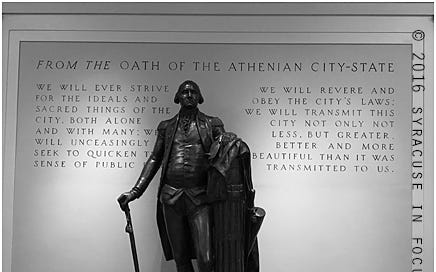Architects Should Take the Athenian Oath
Architecture, Democracy, and Ceremonial Professional Obligation
I have always been surprised that architecture has no professional oath. Doctors take the Hippocratic oath, lawyers swear before a notary to uphold the constitution and legal profession, and engineers (particularly in Canada) can take the Oath of the Engineer. However, architects do not take an oath after graduation or licensure. While these statements are ceremonial and unenforceable, they establish some guiding values and principles for the profession writ large. I submit that an excerpt from the Athenian (or Ephebic) Oath would serve as a great starting point for a professional oath taken by architects. It is contextually relevant to our work in the western canon and focuses on civic issues at the urban scale:
We will ever strive for the ideals and sacred things of the city, both alone and with many; we will unceasingly seek to quicken the sense of public duty; we will revere and obey the city’s laws we will transmit this city not only not less, but greater, better, and more beautiful than it was transmitted to us.
The text above is an excerpt from the Athenian oath inscribed in the Maxwell School of Citizenship and Public Affairs at Syracuse University. The oath was historically taken by young men in ancient Athens entering the Ephebian college: a school for military and civic studies. The students, ephebi, were called to a higher civic service while also suspending their own civic rights.
This is all a bit dramatic for architects, but the spirit of a higher service towards the wellbeing of the city is important to our profession. Many of the American Institute of Architect’s (AIA) contract documents and professional guidelines emphasize public health and safety and the AIA also issues a statement of values. However, boilerplate legalese and glorified press releases don’t require personal buy-in from all members entering the profession.
The Athenian oath wouldn’t be the first time contemporary designers looked back to antiquity for advice if adopted. Vitruvius is considered the “first architect” (to write a book) in western architectural history, and Le Corbusier’s first revelation about the power of architecture that influenced his design philosophy came to him during a trip to Athens. Palladianism revived classical Greco-Roman aesthetics in the mid 1500s and then carried a similar design philosophy to the English colonies in America in the 1700s. Most civic buildings in the United States are designed in a bastardized classical tradition with the classic orders taught in many architecture schools across the country. However, there is a massive elephant in the room…
The United States of America heavily appropriates Athenian aesthetics because Greece is considered the birthplace of democracy. However, Athens was an even more exclusive democracy than the United States currently is. Only land-owning men of Greek origin were eligible for citizenship, and most votes were conducted with arithmetic voting - votes were weighed according to how much money the citizen had. America has a similarly violent relationship to the myth of democracy stemming from the country's original sin - slavery and the systemic genocide of indigenous people who were here first.
The appropriation of Athenian aesthetics was in many ways an attempt to connect a group of petulant wealthy English merchants to a longer history of Greek democratic thinking - democracy rose out of Athens and blossomed in the “new world.” In reality, both democracies fall short of their promise and the people enshrined to protect them often place self-interest above the common good. The world had a piss poor idea of who was human, who could be a citizen, and the effects of that thinking rot the fundamental promise of what democracy could be.
This is, ironically, why the Athenian Oath is relevant. While the Athenian and American democratic models are far from perfect, I fundamentally believe that democracy is about placing public good over personal interest. In short, the excerpt from the Ephebic Oath encourages
Civic responsibility in a sense of public duty,
Accountability in consideration of public laws and concern for public good, and
Sustainability through transmitting a better, more beautiful city.
Architecture has always been a civic minded profession despite many designers’ weariness to engage in politics and public policy. The work we do is inherently political - built projects are always negotiating ownership and access while the aesthetics of these projects reflect the values of the design team and owner. While Athenian and American democracy was built on a shaky foundation, democracy works insofar as citizens continue to engage in civic action. Architects already hold the office of the citizen - a ceremonial commitment to “transmit this city not only not less, but greater, better, and more beautiful than it was” only strengthens the professional commitments of an architect.





